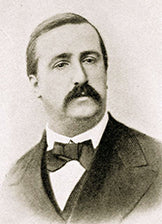About the Russian Composer, Alexander Borodin's Works and Life
Alexander Borodin: Overview
- Born: 1833 - St. Petersburg, Russia
- Died: 1887 - St. Petersburg, Russia
- Historical Period: Romantic
- Musical Media: orchestra, chamber music, keyboard, opera, songs

Composer Alexander Porfir'yevich Borodin was born in the year 1833, in Saint Petersburg, Russia. He was born as an illegitimate son of Prince Luka Gedevanishvili and a peasant, Evdokia Konstantinovna Antonova. This aristocratic connection was responsible for rendering him a substantial education compared to other serfs. He was freed from serfdom in 1843, upon the demise of his father. In 1887, while at a party in traditional Russian wear, amidst dancing and merrymaking, Borodin collapsed and died of a ruptured heart artery.
Some of his major works include:
- In the Steppes of Central Asia (1880), which is a symphonic poem.
- Prince Igor (1887), an operatic piece consisting of four acts. The “Polovtsian Dances” included here is a famous scene at the end of the 2nd act. This is considered his masterpiece.
- String Quartet No. 2 (1881), is a composition inclusive of four movements. The movement “Nocturne” is known for its magnificence in lyrical quality.
Alexander Borodin: Virtuoso of Many Talents
Alexander received a rich heritage from his noble father. Originally from Georgia, his paternal connection tied him to a number of Caucasian kings. His mother was only 24 when she gave birth to him. She, however, went on to marry an army doctor, as there was no provision for a lord and a serf to marry. Since Alexander was born illegitimately, he was named ‘Borodin’ after the last name of a serf belonging to the prince.
From a young age, Alexander Borodin was intelligent, with an innate gift for music. His mother, who insisted that she be addressed as Aunt Mimi by the young Alexander, arranged home tutors for him, and he quickly learned French, German and Italian languages. Although he also had musical tutors for the flute and violoncello, he learned to play the violin on his own. By the age of twelve, he was already someone who could appreciate concerts, and by thirteen, he had composed a piano concerto and a trio for violins and a cello.
Apart from his musical ventures, Alexander Borodin also was an avid follower and subsequent professor of Organic Chemistry. His experiments included fireworks and galvanic processes. Recognizing his talents in science, his mother sidelined his musical pursuits and admitted him to the St. Petersburg School of Medicine. When Borodin graduated as a Medical Doctor in 1858, he could not obtain a separate degree in Chemistry, and thus, became an army surgeon. Here, he met the young officer and later composer Modest Mussorgsky.
Alexander Borodin’s musical pursuits led him to devote hours to practicing string trios, quartets, etc., by eminent composers such as Haydn or Mendelssohn. His love for music was at par with his curiosity for Chemistry. For him, playing the instrument was just the first step toward a holistic understanding of its workings.
In Germany, Borodin met Ekaterina Protopova, his future wife, who was a reputed Russian pianist. She was there for tuberculosis treatment and went out with Borodin to many concerts, displaying their mutual love for music to each other. Ekaterina was a devoted follower of Schumann and Chopin, and this brought the young composer into direct contact with the classics.
Borodin became a full-fledged professor of Chemistry at the Academy of Medicine when he was 31. As a propagator of Women’s Rights, Borodin collaboratively founded the School of Medicine for Women, which probably contributed to the high number of female doctors in Russia today.
Inspired by respected pianist Balakirev, Borodin composed his Symphony No. 1 between 1862-1867. This was influenced by significant works, such as those of French composer Hector Berlioz, and the elements of Ludwig Beethoven’s “Eroica Symphony”.
In 1862, he also joined a musical group named “The Five,” which aimed to promote Russian classical music. The group included Alexander Borodin, Nikolai Rimsky-Korsakov, Modest Mussorgsky, César Cui, and Mily Balakirev. This further inculcated a distinct Russian influence in his compositions. However, his journey with “The Five” wasn’t completely smooth sailing. In 1875, he came at odds with Vladimir Stasov and Modest Mussorgsky when he started working on his “First String Quartet.” His fellow members were known to be hostile towards chamber music and expressed their displeasure at his act.
Alexander Borodin’s musical approach was unique, yet uncomplicated. It evoked a positive feeling in the listener, wrought with the Russian idea of natural beauty. His intuitive talents also assisted him when he composed music for the opera, Prince Igor.
In the aforementioned work, there were certain doubts about the authenticity of Asian nomadic music, since they were long extinct. Later, expert studies proved that Borodin’s music was akin and true to the original style. Apart from Russians, his music also stimulated foreign masters, such as the likes of Maurice Ravel and Claude Debussy. Despite his busy lifestyle as a chemist, professor, and social activist, he produced high-quality pieces, more than compensating for the limited quantity.
After Prince Igor, he left the operatic work to focus on lyricism. Borodin took heart from the widespread success of his Symphony No. 1 and wrote Symphony No. 2 in B minor between 1869-1876. He also composed two string quartets between 1874 and 1881. Another of his works during this period was In the Steppes of Central Asia in 1880. Franz Liszt had good relations with Borodin and used his influence to create opportunities for Borodin’s performances in front of Western audiences. After 1881, however, the Russian composer failed to commit to any major work, since he had both his wife’s failing health and his position as a professor to cope with.
Alexander Borodin passed away from congestive heart failure at an early age of 54. Even though he had an official position as a chemistry professor and a doctor in the course of his life, he managed to churn out an impressive list of works. Some of these, like Prince Igor, remained unfinished at the time of his death. Composers Rimsky-Korsakov and Glazunov saw these completed, from the material left behind. Indeed, Borodin’s work continues to influence musical enthusiasts to this day, and he remains a marvel, balancing great work on both fronts of science and arts.
Reference Links:
- Alexander Borodin on The Famous People
- Alexander Borodin on Classical Net
- Alexander Borodin on My Hero
- Alexander Borodin on Classical Music from BBC Magazine
- Essential Dictionary of Composers by Alfred Publishing
Related piano sheet music:
- Borodin's music: Piano solo sheet music at multi-levels
- By Russian Composers: Piano sheet music at multi-levels
- Classical music: Piano sheet music at multi-levels
- Music from operas: Piano solo sheet music at multi-levels
- Music from orchestral pieces: Piano solo sheet music at multi-levels
- Theme from Polovtsian Dances: Pick your level - Piano sheet music
Read about other Russian composers:
